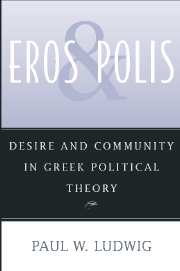Book contents
SEVEN - Patriotism and Imperialism as Eros
Published online by Cambridge University Press: 10 December 2009
Summary
This chapter is intended to make three contributions to political theory: (1) to show the limits of political possibility for the “thick” view of civil society or civic republicanism by examining the most committed, idealistic, tightly-bonded (because erotic) conception of community and by providing a critique of the benefits, dangers, and difficulties of such a committed politics; (2) to sketch the outlines of a theory that would describe certain “peak” political moments when ordinary factors motivating nations and individuals, such as the desires for profit, security, and hegemony, are intensified and transformed in a manner best understood as erotic; and (3) to add an important, qualitatively different political motivation to the traditional list, a “globalizing” or cosmopolitan desire that seeks, among other things, to consume cultural products as commodities in order to satisfy intellectual curiosity about foreign customs, fashions and ideas.
The methodology of this chapter changes somewhat from that of the earlier chapters. I build a theory based on the ideas of Plato, Thucydides, and Aristophanes, attempting to achieve a synthesis. Plato nowhere explicitly applies his erotic theory to the political and military history of the apex and decline of Athenian imperialism. The erotic theory detected in Thucydides' historical account of that period (Chapter 3) remains embedded and can be made explicit only by comparison with ideas outside his text.
- Type
- Chapter
- Information
- Eros and PolisDesire and Community in Greek Political Theory, pp. 319 - 380Publisher: Cambridge University PressPrint publication year: 2002

